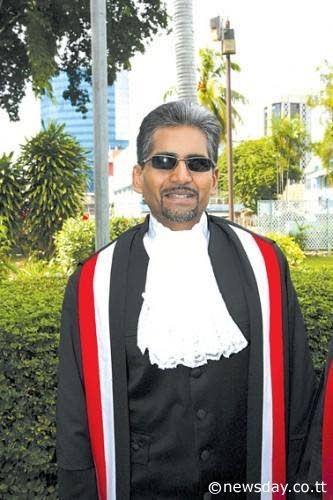Law Association proposes a 5 year suspension

THE LAW Association has proposed a five-year suspension of any order of the court if it opts to strike down or modify section 15(1A) of the law Legal Profession Act (LPA),
In July, the section was deemed unconstitutional by a high court judge who held that it discriminated against non-nationals who want to practise law in TT.
The Attorney General appealed the ruling of Justice Vasheist Kokaram and the matter was deemed urgent by the Court of Appeal which heard arguments on the issue on Tuesday.
Justices of Appeal Nolan Bereaux, Judith Jones and Andre des Vignes have reserved their decision, but in his submission, Senior Counsel Alvin Fitzpatrick, who represented the association, asked that the status of those students who would have started their law studies in 2019 or those who intend to in 2020, be considered.
He asked that there be a five-year suspension period if the appellate court decides to strike down the section or modify it.
In July, Kokaram ruled on an application filed by Grenada-born, St Lucian prospective attorney Dianne Jhamilly Hadeed, who successfully convinced him to grant her the declaration that the section placed an additional burden on a non-national to seek admission to the Hugh Wooding Law School, write an entrance examination, or wait at least additional years to be called to the bar in England and then seek to get their certificate of fitness before being admitted to the local Bar.
Lead counsel for the AG, Fyard Hosein, SC, in his arguments also spoke of the effect striking down the section will have on others, but he emphasised that the separation of powers left it in the legislature’s province to pass legislation to protect the rights of TT citizens, even if it went against international treaties, including the Revised Treaty of Chaguaramas, which established the Caribbean Community (Caricom.)
Apart from the Caribbean Court of Justice having the exclusive jurisdiction over matters related to the treaty, Hosein said the adoption of it was a function of the Executive and it would be “politically problematic,” possibly affecting other Caribbean nations, if the court was to extend the section to include non-nationals. This, he also said, will go against provisions of the regional Council of Legal Education.
According to Hosein, the Legislature can assemble a bundle of rights to non-nationals of TT. “You have only the rights given to you based on the status you occupy,” he said, adding that this was dependent on national policies.
“The right to admission to the bar is one for the Legislature,” he said, adding that Hadeed had the alternative of taking the entrance examination for the Hugh Wooding Law School (HWLS) so she could attain her legal education certificate (LEC) to practise in TT.
“This case has massive implications,” Hosein said, pointing out that if the judge’s decision was upheld anyone with a Caricom skills certificate will have the same rights as a TT citizen.
In reply, Hadeed’s attorney Raisa Caesar pointed out that provision of the Caricom treaty has been incorporated into local legislation, adding that section 15 (1A) of the LPA was discriminatory and it was for the State to justify maintaining the section if it wanted to do so. “There is no evidence to show that the section is reasonably justifiable to maintain it,” she said, adding that by giving preference to nationals was “targeting” non-nationals which went against section 4 of the Constitution. The LPA was amended in 2000 to include section 15(1A) which gave TT law students a “fast-track” option to admission to practise law here.
Senior Counsel Ian Benjamin, who represented the interests of the Registrar of the Supreme Court, who accepts applications for admission to practise in TT, said the 2000 amendment to the LPA which created section 15(1A) cannot be read in isolation, neither could the Constitution when trying to prescribe nationality.
He also pointed out that there was no evidence Hadeed attempted to the HWLS examination, which, he said, was “doable” and has been done by others.
“Some people like to do things quickly. I understand the anxiety (to sit the exam) but it is not a burden,” he said, adding that the requirement to enter HWLC to obtain an LEC was enacted by Parliament in the wider public interest. He admitted that the section 15(1A) created a “short cut,” but according to Benjamin there were different pathways open to different people to practise in TT.
He urged the judges to exercise restraint in arriving at their decision, asking that they also respect the policy decisions which gave rise to the section.
The effect of Kokaram’s ruling was that no one, including TT nationals, could apply under section 15(1) of the LPA to be admitted to practise in TT without a legal education certificate from the Hugh Wooding Law School until the law was amended by Parliament or the ruling was successfully appealed. Section 15(1A) of the LPA allowed TT law students an alternative avenue to enter the profession, without the requirement of obtaining a legal education certificate from the Hugh Wooding Law School if they underwent their six-month in-service training under a practicing attorney, once they had the Legal Practice Course (LPC) and the Bar Professional Training Course (BPTC) from London.


Comments
"Law Association proposes a 5 year suspension"